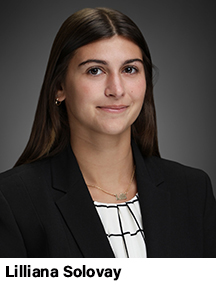Making the smart choice to go from English major to law school
By Amaris Falcon
“When I tell people I’m an English major going to law school, they look at me like I’m crazy." — Me, to 2019 Florida State University alumna and 2022 law school graduate Allison Notari, during a recent interview with her for a profile assignment. (Click the link for the profile.)
The idea that English majors can only be teachers, journalists, or authors is a common misconception. As much as English majors value the Big Three professions, we also affirm that we are not limited by them either.
In fact, while the American Bar Association website does not recognize one undergraduate degree over another, a post under the heading “Preparing for Law School” continues, “[y]ou may choose to major in subjects that are considered to be traditional preparation for law school, such as history, English, philosophy, political science, economics or business.”
To further debunk this stereotype of an English degree leading to jobs only in writing or teaching, I spoke with three Florida State University English alumnae and the English department’s academic program specialist to detail what exactly an English major has to offer the legal field.
 My first interview was with Notari, a 2019 FSU English-Editing, Writing, and Media graduate, who also earned a minor in communication. She took her strong foundation in writing, editing, and critical thinking to Stetson University’s College of Law in St. Petersburg, Florida. She now works as an associate attorney for Zinober Diana & Monteverde P.A., less than a 15-minute drive from her law school alma mater.
My first interview was with Notari, a 2019 FSU English-Editing, Writing, and Media graduate, who also earned a minor in communication. She took her strong foundation in writing, editing, and critical thinking to Stetson University’s College of Law in St. Petersburg, Florida. She now works as an associate attorney for Zinober Diana & Monteverde P.A., less than a 15-minute drive from her law school alma mater.
When Notari began her studies at FSU, her first choice for a major was not English but political science. Knowing she wanted to be a lawyer, she says she figured that path was the one to follow.
After just one poly-sci course, though, she realized the fit was all wrong, and she switched to EWM.
“I knew I liked English and… I knew my writing was relatively strong,” she says. Notari recognized a link between English and law school: writing. She stresses that if you are going to law school, you must have a strong writing background, and she acknowledges that the most vital preparation the EWM major gave her was a solid foundation in that area.
“Make your writing as strong as possible,” she advises, “Even when my research skills lacked, I still had great writing,”
Notari says that her strong foundation in English gave her a leg up on many classmates throughout law school. Still, she cautions students that the nature of an EWM workload varies so starkly from the workload of a law student. Therefore, learning how to study is her next most important tip for law school success.
Getting back into the habit of multiple-choice exams and making outlines was a difficult adjustment from the English-based curriculum she had during undergrad, she admits.
Notari also says the evolution of her writing was another law school adaptation she struggled with.
“In my brain, I wanted to make it sound pretty,” she says about her law school papers.
The adjustment was tough, but one that her strong writing background eased, likely more so than her classmates with conflicting undergraduate degrees.
“My friend was a biology major, so she knew how to study,” Notari says, but not how to write like an English major.
Notari’s hard truth was that law school is demanding, and it takes focus and discipline to adapt. Simultaneously, she would advise students heading to law school to give themselves a “summer brain break” during those few months before. Relaxing is a huge part of preparing for law school, she says, and not much else you do beforehand will be quite as important as rest.
Despite the strenuous classes and grueling tests, Notari speaks very fondly about her time at Stetson. She chose Stetson because Florida is the state where she preferred to practice. She advises aspiring lawyers to attend law school to do the same, “especially if you want to practice in a state that is more exclusive” such as Florida, California, Texas, or New York.
To hear a varied perspective about the valuable benefits of an English major, I exchanged emails with Lilliana Solovay, who is a 1L student this fall at her first-choice school, the University of North Carolina School of Law. She graduated from FSU in December of 2023 with a double major in English-EWM and political science.
 Solovay says many aspects of the EWM curriculum relate to legal skills, and she believes they can be transferable to a law school education. She highlights specific editing courses and reflects on their capability to teach her continuous curiosity and meticulous analysis. Those courses honed her attention to detail and communication skills “immensely,” she says.
Solovay says many aspects of the EWM curriculum relate to legal skills, and she believes they can be transferable to a law school education. She highlights specific editing courses and reflects on their capability to teach her continuous curiosity and meticulous analysis. Those courses honed her attention to detail and communication skills “immensely,” she says.
Another branch of the EWM curriculum she mentions is the abundance of literary works students decipher for classes. Those assignments “refined my ability to think critically and approach problems from multiple perspectives,” proficiencies she relied on for her success in organizing and filling out law school applications and in interviews with admission staff.
One of the most important legs of her EWM education was the construction of coherent arguments, which she says, “has equipped me to be a succinct and effective communicator,” arguably a lawyer’s most essential skill.
Solovay also spoke on how her EWM major supported another fragment of her legal journey: studying for the Law School Admission Test. The LSAT is a four-section law school entrance exam that tests a student’s ability to think critically, logically, and concisely. The EWM skill that benefited her most inside the testing room, she says, was the ability to read and process information promptly.
Achieving a competitive score on the high-stakes test depends greatly on the ability to not only think critically but also quickly. Solovay polished these strengths “through the hours of reading and inspecting literary texts in [her] EWM courses,” she says.
Solovay gives FSU’s English department extensive credit for her continuing success.
“I do not believe I would have gotten where I am today if it weren't for the tools I acquired through the EWM courses,” she says.
An important resource on campus is FSU’s pre-law fraternity, Phi Alpha Delta, and Solovay details her involvement with the group. She speaks specifically about the mentors she acquired through the society, people who helped her understand and tackle the law school application process as well as prepare for what life in law school may resemble.
She recognizes one mentor in particular, Danielle Basdekis, who graduated from FSU in 2023 with dual degrees in political science and in gender and sexuality studies. Solovay says Basdekis’ guidance prepared her for interviews, assisted her in choosing law schools, and helped her stay organized during the application process. Basdekis is now a second-year law student at University of Maryland Francis King Carey School of Law.
Solovay appreciates that connection and others she made in Phi Alpha Delta, saying they aided her growth as a prospective law student and “gave me insights on how I may increase my chances of acceptance.”
For this article, I also spoke with 3L Shepard Broad College of Law-Nova Southeastern University student Sofia Cabrera, who, like Notari and Solovay, attributes her success in law school to her FSU education as an English major.
 Cabrera graduated in May of 2022 under the Degree in Three program as an English-Literature, Media, and Culture major, with a double minor in education and hospitality management. Her time as an English major at FSU, she says, gave her “a small glimpse of what law school would be like.”
Cabrera graduated in May of 2022 under the Degree in Three program as an English-Literature, Media, and Culture major, with a double minor in education and hospitality management. Her time as an English major at FSU, she says, gave her “a small glimpse of what law school would be like.”
Cabrera recounts similar qualities of being an English major that fall into law school’s course of study. For example, she speaks of her day-to-day workload as a law student, which consists of reading numerous textbook pages, analyzing arguments, networking with other attorneys, and continuously stepping outside her comfort zone.
Many of those same challenges, Cabrera notes, she experienced during her English classes at FSU. For law school, Cabrera specifically mentions two Legal Research Writing courses has taken at Nova; while composing arguments or her papers, she realized she “would’ve not known where to begin if [she] did not have [her] English degree.”
Two semesters after taking these courses, she won the CALI Book Award for Legal Research and Writing I and II, which is given to those with the highest grade in the course for the semester.
Cabrera points to many skills she transferred from her role as an FSU undergraduate to her current role as a law student, with time management possibly the most important. During her three years at FSU, she says, balancing organizations such as the Sigma Tau Delta English Honors Society, Hispanic Honors Society, and FSU Her Campus, along with her course schedule, prepared her properly for the time management she would need in law school. Successfully balancing a rigorous class load, extracurriculars, and personal relationships is a huge part of thriving in law school, she adds.
Many lawyers have told Cabrera that law school is “one of the hardest things they’ll ever do.” To this she replies, “I can honestly say that being an English major at FSU prepared me for the challenges and rewards of law school.”
“You go to law school to learn the law, and you go to undergrad to learn to be a good student”; Hannah Beth Ragland, during an interview for this article.
My final interview for this article was with the English department’s academic support specialist and pre-law advisor, Ragland, where she answered some of the hottest, burning questions that fellow pre-law English majors might have when preparing for their next step.
 What is the best course schedule for a pre-law English major?
What is the best course schedule for a pre-law English major?
Ragland stresses the importance of success, and the best schedule is the one most geared toward your personal achievement. This means “choosing classes and subjects that they feel passionate about,” she says. When students enjoy their classes, they are engaged, interactive, and attentive. This translates to better attendance, understanding, and dedication, which is the perfect recipe for an attractive GPA.
What advice would you give to English majors considering law school?
Ragland advises students to seek out an internship or part-time job in the legal field before they make the big commitment. Law school is a huge professional, academic, and financial commitment, she points out, one that students should be sure about.
“You shouldn't go to law school if you don't want to be a lawyer,” she says, “and the best way to figure that out is to get some experience in the legal field.”
In other words, you should try on the designer dress before you buy it. Therefore, consider what you want out of your career and how it would be a good fit first.
What advantages do English majors have in law school?
Ragland says the biggest benefit English majors have is that “this degree teaches students to think critically, write well, and make clear arguments.”
She encourages students to engage with their writing assignments and get as much feedback from their instructors as possible.
“Being a skilled writer will help you stand out—both in the admissions process and as a practicing lawyer,” Ragland says.
An English major has so much to offer the legal field, and the parameters of our post-undergraduate expectations can be widened. After speaking to three English alumnae and the department’s pre-law advisor, an English major seems to be the perfect choice for a pre-law student looking to prepare themselves for what’s to come their way academically and mentally.
Even if others think that’s crazy.
Amaris Falcon is an English-Editing, Writing, and Media major, with a second major in communication and a minor in textile entrepreneurship.
Follow the English department on Instagram; on Facebook; and on X.
